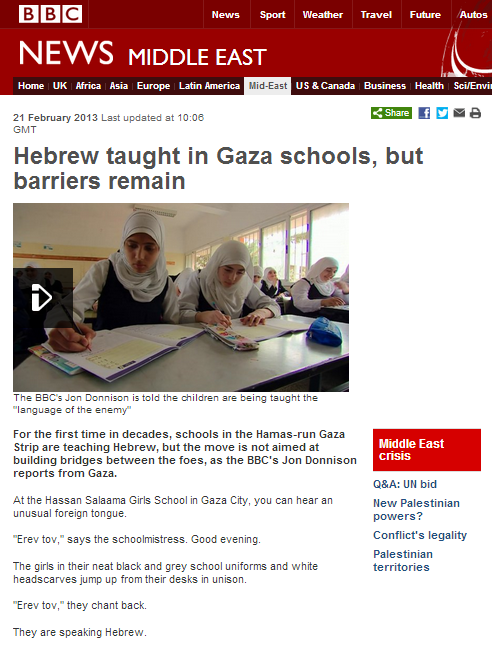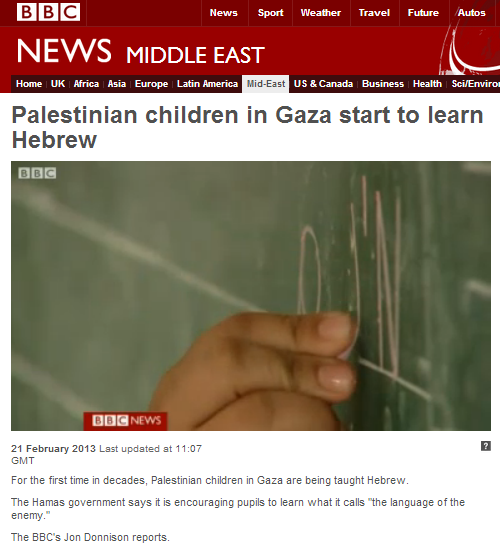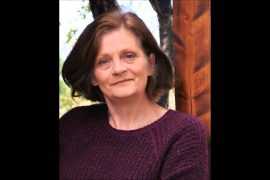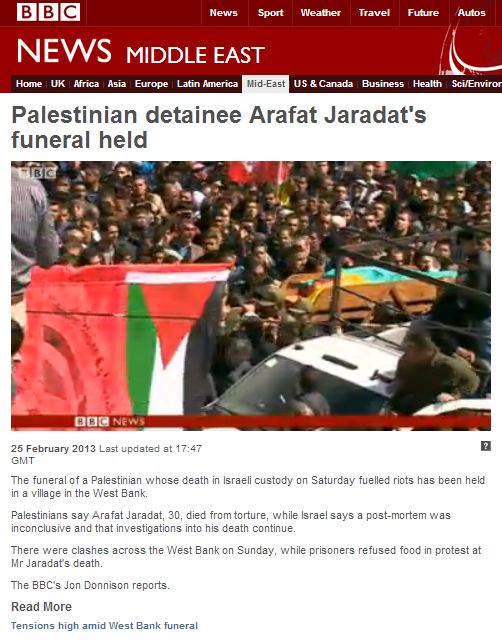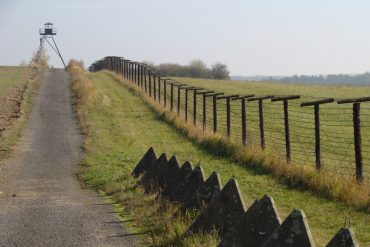On February 21st 2013 the BBC published two versions of the same report by Jon Donnison about Hebrew being taught in schools in Gaza on the Middle East page of its BBC News website – one written and one filmed, with the latter also shown on BBC television news. As previously pointed out here, both reports also appeared on the BBC News website’s UK Education page.
Another version of the same story was also featured on Radio 4’s ‘PM’ programme on February 26th – available here for a limited  period of time from 41:38. In that version, at 43:37, one can hear a translator interpret the words of interviewee Nour Adwan as “If we meet an Israeli and they are speaking in Hebrew..”. Sharp eared listeners will notice that the fifteen year-old actually says the word “Yahud” – Jew – in Arabic rather than “Israeli”, but for some reason, the BBC chose to modify that in translation.
period of time from 41:38. In that version, at 43:37, one can hear a translator interpret the words of interviewee Nour Adwan as “If we meet an Israeli and they are speaking in Hebrew..”. Sharp eared listeners will notice that the fifteen year-old actually says the word “Yahud” – Jew – in Arabic rather than “Israeli”, but for some reason, the BBC chose to modify that in translation.
In all the versions of this report, Donnison too does some pretty nifty rearrangement of the facts in order to make them fit in with his own narrative.
In the written report it is stated:
“In actual fact though, there is very little practical use for the language.
Only one of the 30 or so girls in the class has ever met an Israeli or been to Israel, and that was when the girl was getting medical treatment there.
At the Erez checkpoint, the main border crossing into Israel from Gaza, with its caged walkways and automated steel doors, there is very little traffic.
In previous generations, tens of thousands of Palestinians used to cross into Israel every day for work.
Many older Gazans speak good Hebrew as a result.
But Israel’s blockade of Gaza and the ongoing conflict with Hamas means those days are gone.
Israel, as well as the United States and the European Union, regard Hamas as a terrorist organisation.
Israel issues few permits for Palestinians to leave, citing security reasons.
The Israeli human rights group Gisha, which campaigns for better access for Palestinians to and from Gaza, says in January 2013, on average 174 Gazans were allowed to leave through Erez each day.
Most of them, the organisation says, were people seeking medical treatment and their relatives, as well as Palestinian businessmen.”
In the filmed report Donnison says:
“..there’s little practical use for the language. Thousands of children across Gaza are now learning Hebrew in Hamas schools but the truth is, very few of them have actually been to Israel and very few of them have ever met an Israeli.
At the border crossing there’s little traffic in or out of Gaza. In previous generations tens of thousands of Palestinians used to head into Israel every day for work. But Israel’s blockade and the conflict with Hamas means those days are long gone.”
An identical message is conveyed in the radio item.
So in all these reports, Donnison suggests that Palestinians stopped travelling to Israel because of the partial blockade initiated in mid-2007 after the violent Hamas take-over of the Strip and the expulsion of the internationally recognised Palestinian Authority by Hamas. In doing so, Donnison airbrushes out of the picture the fact that passage in and out of the Gaza Strip had to be restricted several years prior to that because of the entry of suicide bombers and other terrorists into Israel and the resulting civilian casualties during the second Intifada which began in September 2000.
In other words, Palestinian actions which resulted in Israel having to implement measures to defend its civilian population are converted by Donnison into punitive unilateral Israeli actions.
And what of Donnison’s claim in both articles that there is “little traffic in or out of Gaza”? In the written report, Donnison quotes his old favourite, the political NGO ‘Gisha‘ as saying that a daily average of 174 Palestinians left the Strip during January 2013. That would mean that 5,394 people made the crossing in the month as a whole. Even if accurate, those figures mean little when presented without context.
“A report published in 2012 by the World Health Organization (WHO) reveals figures showing the coordination and liaison efforts invested by Israel and COGAT seeking to approve the entry of Palestinian patients from the Gaza Strip into Israel for medical treatments in Israeli hospitals. The key data presented in the report show that 91.5% of the applications which were filed, asking for medical treatment in Israel, were ultimately approved, 7.2% are pending security check and 1.3% of the applications were rejected, this indicating the attitude of the State of Israel to humanitarian and medical cases and the importance and urgency ascribed to such applications.
In 2012, 16,553 Palestinians entered Israel from the Gaza Strip, for the purpose of receiving medical treatment in hospitals situated both in Israel and in the Judea and Samaria Region. “Since the opening of the Rafah Crossing to traffic by Egypt, less people are seen leaving through the Erez Crossing, out of personal considerations of the Palestinian sick people and patients in the Gaza Strip”, informs a Gaza DCL senior official.”
[emphasis added]
In addition to those entering Israel for medical treatment, farmers from Gaza often visit agricultural exhibitions and conferences in Israel, as do other businessmen and professionals. Last Christmas, over 500 Christians from Gaza travelled to Bethlehem for the holiday celebrations.
Whilst it is certainly true that “tens of thousands” of Palestinians no longer enter Israel from the Gaza Strip to work each day, it is significant that Donnison elects to conceal from his audiences the real reasons behind that, by failing to mention the role of Palestinian terrorism in bringing it about. It is also significant that he fails to make the connection between the kind of fanaticism which brought about the Palestinian decision to engage in terrorism and the frankly disturbing views expressed by some of the young interviewees in his report. It is, after all, such fanaticism which has made walls, fences and security checks necessary in order to prevent the loss of Israeli lives.
But of course to explain to BBC audiences the link between restrictions on the movement of Palestinians and the choice made by Palestinian society to support terror against Israeli civilians would make it much more difficult to turn this report – ostensibly about children in Gaza learning Hebrew – into a vehicle for the advancement of the standard BBC narrative of Palestinians as victims.

